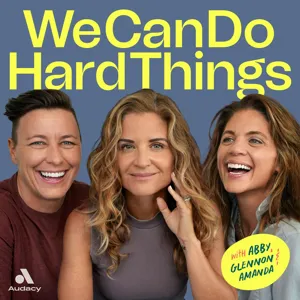Podcast Summary
Solving everyday problems for parents and individuals: Pampers ensures babies' skin stays dry with Swaddlers diapers and leak-proof wipes, while 3rd love helps individuals find a perfect bra fit with half cup sizes, virtual fitting room, and educational resources.
Both Pampers and 3rd love prioritize providing solutions to common problems for parents and individuals, respectively. For parents, Pampers offers gentle protective care for babies with their Swaddlers diapers and leak-proof wipes. For individuals, especially women, 3rd love addresses size exclusivity and uncertainty in finding a comfortable and well-fitting bra through their half cup sizes, virtual fitting room, and educational resources. Both brands aim to make daily life easier and more enjoyable for their customers. Pampers' Swaddlers diapers absorb wetness better than the leading value brand and provide 100% leak-proof protection, ensuring babies' skin stays dry and healthy. The new Pampers free and gentle wipes are made from 100% plant-based cloth and are tear-resistant. 3rd love revolutionized the bra industry by introducing half cup sizes and a virtual fitting room to help individuals find the perfect fit. Their website also includes a bra 101 education section and a ton of great reviews from real people. So, whether it's keeping babies' skin healthy and dry or helping individuals find a comfortable and well-fitting bra, these brands are dedicated to solving everyday problems and making life easier for their customers. Download the Pampers Club app to earn rewards and visit 3rdlove.com to get $15 off your order with code podcast 15.
Adapting to unexpected situations in conversation: Being adaptable, open-minded, and willing to engage in meaningful dialogue are essential for effective communication and understanding.
Effective communication and understanding require flexibility and the ability to adapt to unexpected situations. In the conversation, the speakers demonstrated this through their playful banter and their willingness to challenge each other's perspectives. They also highlighted the importance of being open to receiving emotions like vulnerability and acknowledging the need for help. The conversation touched on various topics, including the challenges of rapid-fire questioning and the difficulty of expressing certain emotions. They also shared personal experiences and used humor to keep the conversation light and engaging. Overall, the conversation emphasized the importance of being adaptable, open-minded, and willing to engage in meaningful dialogue.
Communicating Anxiety in Relationships: Effective communication and self-awareness help manage stress and anxiety in relationships. Overfunctioners can recognize their role and seek help to strengthen partnerships and build trust.
Effective communication and self-awareness are crucial in managing stress and anxiety, especially in relationships. The speaker shares how she's learned to communicate her anxiety to her partner, setting expectations and asking for help with specific tasks. This approach has led to a stronger partnership and increased trust. Overfunctioners, who naturally feel responsible for ensuring things go right, can benefit from recognizing that this mindset can be both a blessing and a curse. By acknowledging their role in a situation and seeking help when needed, they can empower themselves and those around them to work together as a team.
Overfunctioning in relationships can lead to underfunctioning: Overfunctioning can create a vicious cycle, leading to disengagement. Balance emotional expression and clear boundaries.
Overfunctioning in relationships, while well-intentioned, can lead to underfunctioning in others. This dynamic can create a vicious cycle where the overfunctioner's involvement becomes overwhelming, causing the underfunctioner to disengage. This can be particularly challenging in a hiring context, where 9 out of 10 hiring managers are reportedly struggling to find talent. To address this, specialized recruiting professionals from Robert Half can help connect businesses with highly skilled talent. In relationships, it's essential to recognize the importance of striking a balance between allowing emotional expression and setting clear boundaries for action. Overfunctioning can stem from a belief in doing things right, but it's crucial to be open to reevaluating and adjusting this mindset when necessary. Miscommunication and unintended harm can result when one partner feels betrayed by the other's actions, even if they stem from a place of love. It's essential to foster open dialogue and work together to define the line between feeling and acting.
Recognizing the importance of trust and shared responsibility in partnerships: Empowering each other to lead and trusting each other's ideas are crucial for successful partnerships, avoiding feelings of isolation and resentment.
Effective partnerships require trust and shared responsibility. Overfunctioning, or taking on too much control, can lead to feelings of isolation and resentment. It's important to recognize that no one has all the answers and that the benefits of a partnership come from the combination of both parties' wisdom and perspectives. Trusting each other's ideas and empowering each other to lead is crucial for avoiding a sense of betrayal and ensuring a successful partnership. In the conversation discussed, both parties came to the realization that they needed each other's input and leadership to avoid running their family into the ground. This recognition led to a deeper connection and a more balanced approach to decision-making.
Recognize and value unique strengths and perspectives: Effective partnerships thrive when individuals support each other's strengths, fostering authentic engagement and growth.
Effective partnership and parenting require recognizing and valuing the unique strengths and perspectives of each individual. Trying to control every decision or following a preconceived script can lead to a lack of authentic engagement and growth for both parties. Instead, it's essential to encourage and support each other's strengths, fostering a non-ghostlike presence in the relationship. Overfunctioners, in particular, may be drawn to more relaxed partners to balance their own tendencies. Remember, the combination of two full human beings expressing themselves freely is what makes a relationship rich and meaningful.
Challenges in relationships from unrealistic expectations: Communicate clearly, understand roles, and trust imperfect efforts for successful relationships
Relationships can be challenging when we hold unrealistic expectations of our partners based on our own narrative about ourselves. When the "love drug" wears off, we may see our partner's passive behavior as a lack of care or laziness, but in reality, they might be smart and capable individuals who know how to read the room and play their role in the relationship. The over-functioner in a relationship may feel the need to take charge and lead, but when their partner steps up and makes mistakes, they may struggle to let go. It's essential to establish clear communication and mutual understanding about the end result of shared tasks and goals, and to trust that your partner's efforts, even if imperfect, will contribute to the relationship's success. The Goldman Environmental Prize is a testament to the power of ordinary people making an extraordinary impact, and serves as a reminder that setting our minds to something and being passionate about it can bring about change.
Trusting each other in collaboration: Trusting team members and delegating responsibilities can lead to reduced stress, increased productivity, and successful outcomes.
Effective collaboration requires trust and letting go of the need to control every aspect of a situation. In the shared story, one parent, John, took the lead on an issue important to him, improving bus stop safety for their children. The other parent, initially anxious and fearful, eventually trusted John's ability to handle the situation and let go of her overfunctioning tendencies. This trust paid off, resulting in a successful outcome. This dynamic can be applied to various aspects of life, including work situations, where trusting team members and delegating responsibilities can lead to reduced stress and increased productivity. Additionally, recognizing the blessings and curses of being overly invested in others' lives can help individuals navigate the challenges of collaboration while also appreciating the benefits of connection and support.
Trusting others to take charge brings relief and leads to better outcomes: Effective delegation brings relief, trust, and improved outcomes. Don't over-function or micromanage, trust that everyone is contributing their best.
Effective delegation and trusting others to take on responsibilities can bring significant relief and lead to better outcomes. The speaker shared an experience where they asked someone to take charge of a project, and the sense of trust and collaboration that ensued was a huge relief and led to improvements that the speaker may not have thought of. However, it's important to remember that delegating doesn't mean abdicating responsibility entirely. It's about knowing what is yours to do and what is someone else's to do, and trusting that everyone is contributing their best. Over-functioning and micromanaging can create unnecessary stress and hinder progress. When everyone shares the load, the magic happens, and the end result is often better than what any one person could have achieved alone.
The value of collaboration and trust for personal growth and effective leadership: Collaboration and trust are crucial for personal growth and effective leadership. Trusting others to handle responsibilities allows for peace of mind and focus on what one can control.
Collaboration and trust are essential for personal growth and effective leadership. The speaker shared her experience of working on a project with her team and parents, where she discovered the value of having support and wisdom from others. She reflected on her past experiences of giving away all her money, which left her feeling confused and ashamed. When she started a relationship with her current partner, Abby, she felt reassured that she would never have to face that situation again. The speaker emphasized that trusting others to handle responsibilities allows for peace of mind and the ability to focus on what one can control. She also highlighted the versatility and comfort of Vuori clothing, which adds to her overall happiness and confidence. Overall, the discussion emphasized the importance of collaboration, trust, and self-care in achieving personal and professional goals.
Overfunctioners need someone to share accountability: Overfunctioners in relationships desire support and shared responsibility, but communication and trust are key to making it work.
People who overfunction in relationships often feel a strong need to maintain control, and what they truly desire is for someone to take some of that burden off their shoulders and share accountability. This can be a challenge for both parties, as each person may have different ideas of what accountability looks like. However, creating an environment where both partners feel safe to bring their full selves and make mistakes can lead to a healthier, more balanced relationship. It's important for overfunctioners to communicate their needs and trust their partners to contribute and help steer the ship together. By acknowledging each other's roles and working as a team, both partners can feel less alone and more supported.
Engage with the podcast community: Follow, rate, and share episodes to stay updated and help the podcast reach more people. The supportive community can provide valuable support and connection.
The speaker encourages listeners to engage with the podcast by following, rating, and sharing episodes. This not only benefits the listeners by ensuring they don't miss new episodes, but also helps the podcast grow and reach a wider audience. The speaker also acknowledges that some listeners may feel judged, but reassures them that the podcast community is supportive and there to help each other through difficult times. Overall, the message is to continue listening and engaging with the podcast, as it can provide valuable support and connection.





